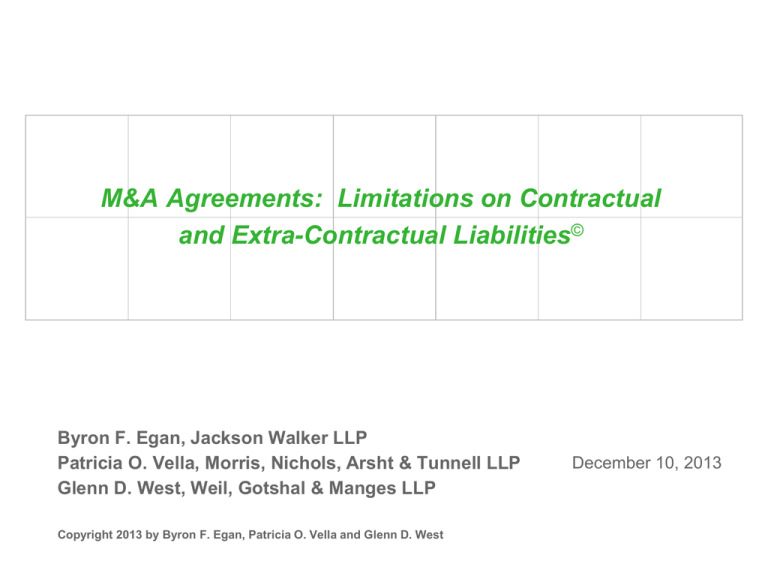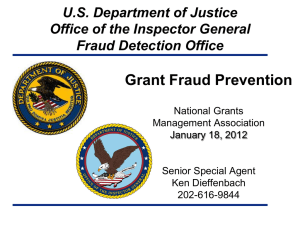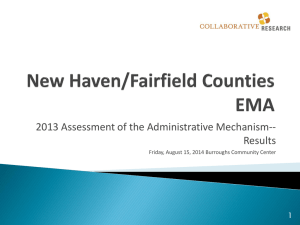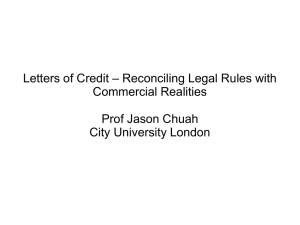Post-Closing: Fraud Claims
advertisement

M&A Agreements: Limitations on Contractual and Extra-Contractual Liabilities© Byron F. Egan, Jackson Walker LLP Patricia O. Vella, Morris, Nichols, Arsht & Tunnell LLP Glenn D. West, Weil, Gotshal & Manges LLP Copyright 2013 by Byron F. Egan, Patricia O. Vella and Glenn D. West December 10, 2013 Table of Contents ■ ■ ■ ■ ■ ■ ■ ■ ■ ■ ■ ■ ■ ■ ■ ■ Perspective Pre-Signing Definitive Documents Between Sign and Close Post-Closing: Fraud Claims Post-Closing: Survival Clauses More on Fraud: Not all Erroneous Statements of Fact Constitute Fraud More on Fraud: Non-Party Liability More on Fraud: Exclusive Remedies More on Fraud: Liability Limitations More on Fraud: Disputed Boundaries Between Tort, Contract and Equity Model Provision – Entire Agreement Model Provision – Nature of Representations and Warranties Model Provision – Non-Reliance of Buyer Model Provision – Non-Recourse Model Provision – Exclusive Remedies Further Reading 2 Perspective ■ Purchase agreements frequently incorporate well-defined indemnification and liability limitation provisions ■ Buyers dissatisfied with the deal often attempt to circumvent such provisions by premising tort-based fraud and negligent misrepresentation claims on the alleged inaccuracy of purported pre-contractual representations and/or express, contractual representations ■ Tough to define, easy to allege, hard to dismiss on a pre-discovery motion, difficult to disprove without expensive and lengthy litigation, highly susceptible to the erroneous conclusions of judges and juries 3 Pre-Signing Definitive Documents ■ WTG Gas Processing, L.P. v. ConocoPhillips Co., 2010 Tex. App. (Tex. App. Houston 14th Dist. March 2, 2010) held: ■ An unsigned bid procedures letter with “no legal obligation” language and specifying that a bid will only be deemed to be accepted upon execution and delivery of a purchase agreement controls because the parties relied on it ■ A phone conversation in which Seller told the first bidder that they have a “deal” and will work to sign a definitive purchase agreement (which turned out to be untrue, and prompted that bidder to sue for fraud/negligent misrepresentation/tortious interference with contract) was insufficient to constitute a waiver of the bid procedures letter ■ The non-binding and “no legal obligation” language in the bid procedures letter allowed the Seller to continue to shop the deal to other bidders until execution and delivery of a purchase agreement 4 Pre-Signing: Anti-Reliance Provision in NDA ■ RAA Management, LLC v. Savage Sports Holdings, Inc., 45 A.3d 107 (Del. 2012): ■ At the diligence stage, seller and potential acquiror entered into a confidentiality agreement including (i) non-reliance provision, (ii) disclaimer of seller liability from use of information and (iii) waiver of claims potential acquiror might have had in connection with any potential transaction unless a definitive sale agreement is signed ■ Potential acquiror sued for fraud, demanding $1.2MM in “sunken due diligence costs” because it never would have attempted to acquiror the seller had seller not “misrepresent[ed] to and conceal[ed] from” it three alleged “material unrecorded liabilities and claims against it” ■ Applying NY law, but concluding the result would be the same in DE, the DE Superior Court, affirmed by DE Supreme Court, found that the confidentiality agreement protected seller even from intentional fraud ■ Delaware’s “public policy in favor of enforcing contractually binding written disclaimers of reliance on representations outside of a final agreement” 5 Pre-Signing: Agreements to Negotiate ■ ■ EQT Infrastructure Ltd. v. Smith, 861 F. Supp. 2d 220 (S.D.N.Y. 2012) ■ EQT negotiated for 9 months, and eventually signed, a letter of intent (governed by NY law) to negotiate an acquisition of certain of Smith’s businesses for a set price. The LOI required Smith to “work with [EQT] in good faith and on an exclusive basis” until a certain date or EQT’s earlier termination. The “good faith” provision was binding because it was listed as an exception to the “Non-Binding Effect” paragraph. ■ After the exclusivity period ended, Smith requested an increase in purchase price, stating that it would not sell for the lower price because Smith did not find a buyer for a different business ■ The court found EQT plausibly stated a claim for breach of contract, either because of a secret condition during the exclusivity period, or because the good faith requirement may have extended beyond the exclusivity period PharmAthene, Inc. v. SIGA Tech’s, Inc., 2011 WL 4390726 (Del. Ch. Sept. 22, 2011) (finding that potential licensor had failed to negotiate a license in good faith—as required by the terms of a terminated merger agreement—but rather than granting specific enforcement of a non-binding term sheet for a license agreement, awarding expectation damages in the form of an equitable payment stream based on economic terms that likely would have resulted after negotiation) 6 Between Sign and Close—Breaches of Lock-Ups ■ NACCO Indus. v. Applica Inc., 2009 Del. Ch. LEXIS 217 (Del. Ch. Dec. 22, 2009) held that the “no-shop” and “prompt notice” provisions in the merger agreement are enforceable against the Seller. Jilted buyer could pursue breach of contract claim under merger agreement in light of target’s continued secret strategic discussions and sharing of confidential information that resulted in a superior proposal. Damages would be measured by the loss of the strategic benefit to the jilted buyer ■ Global Asset Capital, LLC v. Rubicon US REIT, Inc., C.A. No. 5071-VCL (Del. Ch. Nov. 16, 2009) held that similar lock-up provisions in a letter of intent are enforceable against the Seller, enjoining the Seller from engaging in sale discussions with third parties while declining to negotiate with Buyer 7 Between Sign and Close (continued) ■ Ventas, Inc. v. HCP, Inc., 647 F.3d 291 (6th Cir. 2011) affirmed jury award of $100 million after finding a rival bidder that had breached its standstill agreement with the target liable for tortious interference to a winning bidder in an auction. The jury award represented the increase of the offer by the winning bidder to secure stockholder approval after announcement of the rival bidder’s topping bid ■ WaveDivision Holdings, LLC v. Millennium Digital Media Systems, L.L.C., 2010 WL 3706624 (Del. Ch. Sept. 17, 2010) held that company selling assets breached the no-shop and best efforts clauses of an asset purchase agreement by pursuing an alternative and “mutually exclusive” refinancing transaction. The Delaware Court of Chancery awarded $15 million in expectancy damages to the jilted buyer 8 Post-Closing: Fraud Claims ■ ABRY Partners V, L.P. v. F&W Acquisition LLC, 891 A.2d 1032 (Del. Ch. 2006) held that Seller (who allegedly falsely represented that its financials were accurately stated, which Buyer claimed resulted in a $100MM overpayment) should not receive the benefit of the exclusive remedy provision – opening the door for Buyer to collect more than the $20M indemnity cap in its fraud claim or rescind the acquisition – if Seller knew that one of Target’s contractual representations and warranties was false or if Seller otherwise “lied” to Buyer about a contractual representation and warranty, even though the exclusive remedy provision had no fraud exception or anti-sandbagging provision ■ If, however, Seller made an innocent, negligent or even grossly negligent (but not reckless or intentional) false representation or if Seller was unaware that one of Target’s contractual representations was false, then Buyer would not be entitled to an equitable remedy and would be stuck with the bargained-for exclusive remedy of capped indemnity 9 Post-Closing: Fraud Claims (continued) ■ Anvil Holding Corp. v. Iron Acq. Co., Inc., 2013 WL 2249655 (Del. Ch. May 17, 2013), declined to dismiss (i) claim against management for fraud based on company representations in a purchase agreement and (ii) claims for fraud based on extra-contractual representations because, although contract contained an extra-contractual representation disclaimer, it did not contain a non-reliance provision and did contain a fraud exception to the sole remedy language ■ Transdigm v. Alcoa Global Fasteners, Inc., 2013 WL 2326881 (Del. Ch. May 29, 2013), declined to dismiss fraud claims based on active concealment in part because non-reliance provision in stock purchase agreement extended only to extra-contractual representations and not to accuracy or completeness of evaluation material or to omissions 10 Post-Closing: Fraud Claims (continued) ■ Barr v. Dyke, 49 A.3d 1280 (Me. 2012), applying DE law and citing RAA, held that a reliance disclaimer in a stock purchase agreement barred plaintiff’s rescission claim because it prevented plaintiff from proving it relied upon fraudulent information when entering into the agreement ■ Pyott-Boone Electronics Inc. v. IRR Trust for Donald L. Fetterolf Dated December 9, 1997, 918 F.Supp.2d 532 (W.D. Va. 2013), applying DE law, rejected disappointed buyer’s claims for breach of purchase agreement based on information provided in diligence, particularly in light of the “entire agreement” provision in the contract: plaintiff presented an impossibly broad interpretation of a provision to the effect that all representations were correct and did not omit or misstate any material facts 11 Post-Closing: Fraud Claims (continued) ■ ■ Italian Cowboy Partners, Ltd. v. Prudential Ins. Co., 341 S.W.3d 323 (Tex. 2011), held that merger clause does not waive the right to sue for fraudulent inducement, should a party later discover the reps it relied upon in signi unless the clause also expressly disclaims reliance on representations (thus negating an essential element of a claim for fraudulent inducement) and it is insufficient to merely state that promisor has not made any representations or promises except as expressly set in the agreement Allen v. Devon Energy Holdings, L.L.C. F/K/A Chief Holdings, L.L.C. and Trevor Rees-Jones, 367 S.W.3d 355 (Tx. Ct. App. First Dist. 2012), arose out of a redemption of LLC interests two years prior to sale of company for almost 20 times the redemption sales price; in the context of allegations by seller that CEO and majority owner fraudulently induced seller to sell and citing ABRY and Italian Cowboy, held that disclaimer and release provisions in the redemption agreement relating to the value of the company did not negate reliance or materiality as a matter of law, particularly since alleged omissions related to seller’s decision whether to sell rather than value of company, and that a fact issue existed as to fraud and the existence of a fiduciary relationship that would support a claim for breach of the fiduciary duty of disclosure 12 Post-Closing: Fraud Claims (continued) ■ ■ Staton Holdings, Inc. v. Tatum, L.L.C., 345 S.W.3d 729, (Tex.App.-Dallas 2011), held that an express-intent requirement, under which a release of liability is enforceable only if the intent to grant such a release is conspicuously expressed in specific terms within the four corners of the contract, applies to prospective releases of future breaches of warranty in service transactions Italian Cowboy, Allen and Staton Holdings read together suggest that the following principles should be considered when attempting to contractually limit liabilities under Texas law: ■ ■ ■ ■ ■ ■ Do not appear to use boilerplate provisions, however comprehensive, and tailor the limitation of liability for each transaction to show it has been specifically negotiated Expressly disclaim reliance on any reps not embodied in the four corners of the agreement (and perhaps even in particular enumerated sections thereof) Expressly state that no reliance is being placed on statements (i) by representatives of any of the parties whose liability is limited or (ii) in the dataroom (if applicable) Expressly state that no reliance has been placed on any prior reps Include broad limitation of liability language and specifically address the particular kinds of representations not being relied upon Use bold face or other conspicuous type for the limitation of liability provisions 13 Post-Closing: Fraud Claims (continued) ■ If the Seller agreed to include an exception for fraud and/or “willful breach,” then Seller’s intentional failure to disclose that a representation is no longer true as of closing would entitle Buyer to exercise legal and equitable remedies outside of the exclusive remedy (e.g., bypassing indemnity thresholds and caps, rescission, etc.). ■ See Ameristar Casinos, Inc. v. Resorts Int’l Holdings, LLC, C.A. No. 3685VCS (Del. Ch. May 11, 2010). ■ See also Merrill Lynch & Co., Inc. v. Allegheny Energy, Inc., No. 02 Civ. 7689, 2005 WL 832050 (S.D.N.Y. Apr. 12, 2005) (express carve-out for causes of action arising from fraud renders [exclusive remedies provision] meaningless if action is based on claim of fraud) 14 Post-Closing: Survival Clauses ■ ■ The Delaware Court of Chancery, in GRT, Inc. vs. Marathon GTF Technology, Ltd., 2011 WL 2682898 (July 11, 2011), construed a survival of representations clause, together with a provision stating that the sole remedy for breach of such representations would terminate at the same time, as a contractual shortening of the otherwise applicable statute of limitations of three years for a breach of contract claim. The Buyer did not file suit until after the survival period expired; therefore, the Court found the buyer’s claim to be time-barred and dismissed the claim. The Court came to a similar conclusion in ENI Holdings, LLC v. KBR Group Holdings, LLC, C.A. No. 8075-VCG (Del. Ch. Nov. 27, 2013), enforcing a stock purchase agreement provision that shortened the statute of limitations for bringing indemnification claims based on alleged breach of certain reps and warranties, noting that under the provision the claims were time barred to the extent the claim was not filed before expiration of the period, regardless of whether notice of claim was given before the bar date; but allowing fraud claims to proceed after finding that the contract was ambiguous as to whether the parties intended for the contractual time limitation to apply to fraud claims as well 15 More on Fraud: Not all Erroneous Statements of Fact Constitute Fraud ■ Jones v. Thompson, 338 S.W.3d 573 (Tex. App.--El Paso August 11, 2011) involved allegations by a Seller of mineral interests of breach of fiduciary duty and fraud against the Buyer ■ Statements by the Purchaser/Defendant’s drilling superintendent that he would not further develop the leases and would hold at existing production, without intention for the other party to rely or act upon such reliance, do not alone constitute fraud ■ The Purchaser/Defendant’s offer to buy the Seller’s mineral interests for $55,000 was not a misrepresentation of a material fact; rather it was purely an expression of opinion. Thus, the expression of opinion was not an actionable fraud claim. The Court supported their conclusion with the fact that the Seller believed it was a fair price, and furthermore, the Court rejected the theory that a below market value offer constitutes fraud. Additionally, the Court did not find that there was an unequal level of knowledge between the Buyer and Seller, because the Seller had a duty to value his own mineral interests with a level of reasonable diligence 16 More on Fraud: Non-Party Liability ■ ■ DDJ Management, LLC v. Rhone Group L.L.C., 931 N.E.2d 87 (N.Y. 2010) involved a borrower that failed to repay certain loans. Plaintiffs (lenders) alleged that parents of the defendant borrower defrauded plaintiffs into making the loans by making false contractual representations. The representations in the loan agreement were made by the borrower (not affiliates of the borrower) ■ The court held that a party to an agreement with a corporation is not unjustified in assuming that the corporation’s controlling affiliates would not knowingly allow the corporation to make a false representation/warranty. Therefore, a jury could find the plaintiffs were justified in relying on the representations defendants made to them ■ Result: virtually any representation/warranty in a contract that later proves to be false could be turned into a fraud claim against non-party affiliates In Taylor v. First Community Credit Union, 316 S.W.3d 863 (Tex. App. 2010), the court held that, under Texas law, failure to timely pay franchise taxes can result in the imposition of personal liability on the directors and officers of a corporation for damages resulting from breaches of contractual obligations by the corporation after the date that the franchise taxes were due even though the contract was properly entered into by the corporation prior to the due date of the franchise taxes 17 More on Fraud: Exclusive Remedies ■ ■ ■ ■ ■ ■ In Lone Star Fund V (US), LP v. Barclays Bank PLC, 594 F.3d 383 (5th Cir. Tex. 2010), Seller sold a set of mortgage-backed securities to Buyer via a prospectus that contained a representation that none of the mortgages are delinquent at the time of purchase 290 of 10,000+ mortgages backing the securities were delinquent at the time of purchase, so Buyer sued Seller for fraud Seller argued that because it had performed under a separate “repurchase or substitute” exclusive remedy clause in the prospectus, whereby Seller repurchases or substitutes a performing mortgage for any delinquent mortgages, Seller did not make an actionable misrepresentation The court sided with Seller, interpreting the representation to read “the mortgages should be non-delinquent,” but if some mortgages are delinquent then Seller will repurchase or substitute In the typical M&A context (e.g., ABRY), a judgment regarding the exclusive remedy provision and what type of misrepresentation occurred can mean the difference between capped indemnity on the one hand and uncapped indemnity or rescission on the other hand, i.e., millions of dollars in a zero-sum game between buyer or seller Here, implicit in the court’s ruling that Seller did not defraud Buyer is the fact that Buyer and Seller agreed ex ante to an equitable exclusive remedy – “repurchase or substitute” – designed to return Buyer to its 0% delinquent position 18 More on Fraud: Liability Limitations ■ MyPlayCity, Inc. v. Conduit Limited, 2011 WL 3273487 (S.D.N.Y. July 29, 2011) stands for the proposition that, under NY law, a damage limitation provision that "unambiguously limits …liability for certain enumerated types of damages to zero [lost profits, consequential, etc…] and for all other types of damages to $5,000" is enforceable absent egregious intentionally tortious behavior 19 More on Fraud: Disputed Boundaries Between Tort, Contract and Equity ■ ■ ■ “Fraud” is a many splendored thing that is not limited to intentional lying and can in fact be premised upon a so-called “innocent” misrepresentation “Equitable fraud” may exist even if a statement is made without the common law element of recklessness or knowing falsehood (and with or without a showing of negligence) if considerations of equity demand an equitable remedy—e.g., a rescission claim, or a damage claim against a person with whom the claimant had a “special relationship” The equitable fraud concept puts pressure on the scope of “fraud carve-outs” ■ Gryzbowski v. Tracy, C.A. No. 3888-VCG (Del. Ch. Aug. 9, 2013) (finding that remedy of rescission of contract to purchase a condominium with undisclosed leaking problems was inappropriate in connection with alleged fraud and equitable fraud because, inter alia, (i) plaintiff did not meet burden of proving scienter, (ii) seven years passed and the housing market declined, and (ii) the defendant was not aware that a $40,000 assessment from the condo board was “reasonably likely”) ■ Osram Sylvania Inc. v. Townsend Ventures, LLC, 2013 WL 6199554 (Del. Ch. Nov. 19, 2013) (granting sellers’ motion to dismiss buyer’s equitable fraud claim based on an argument that sellers learned prior to closing stock sale that company had significantly underperformed its forecasts in the most recent quarter because there were no “special equities”; but finding that these facts could establish common law fraud or a breach of reps and covenants in the contract entitling buyer to indemnification under the agreement) 20 More on Fraud: Disputed Boundaries Between Tort, Contract and Equity (continued) ■ Wylie, Inc. v. ITT Corp., 2013 WL 5754086 (N.Y. Sup. Ct. Oct. 21, 2013) (buyer who had failed to comply with the contractual indemnification requirements (and therefore had his contract-based breach of contract action based on an express warranty dismissed because his notice was late) permitted to re-plead a fraud claim based on that same express warranty that was unavailable by contract) ■ ■ Notwithstanding the recognition that in NY “a cause of action for fraud does not arise when the only fraud charged relates to a breach of contract,” a misrepresentation of material facts can give rise to a fraud claim even if that misrepresentation is contained in an express warranty in the contract The prohibition in NY on fraud claims that are duplicative of breach of contract claims is limited, according to this court, to fraud claims that are based on a future intent not to perform a contractual promise, not fraud claims that are based on a misrepresentation of present facts. Thus, claims asserting fraud and breach of contract arising from the same express contractual warranty can give rise to both a breach of contract claim and a fraud claim (even in NY) because a claim of misrepresentation of a present fact is always considered collateral to a contract (even if that misrepresentation is made in the contract). And the justifiable reliance element of a fraud claim can be met simply by the fact that the party claiming reliance had the express contractual warranty included in the contract in the first instance (so this is not cured by the non-reliance provisions that simply refer to extra-contractual misrepresentations). 21 Model Provision – Entire Agreement ■ This Agreement supersedes all prior agreements, whether written or oral, between the parties with respect to its subject matter (including any letter of intent and any confidentiality agreement between Buyer and Seller) and constitutes (along with the Disclosure Letter, Exhibits and other documents delivered pursuant to this Agreement) a complete and exclusive statement of the terms of the agreement between the parties with respect to its subject matter. This Agreement may not be amended, supplemented or otherwise modified except by a written agreement executed by the party to be charged with the amendment. 22 Model Provision – Nature of Representations and Warranties ■ All representations and warranties set forth in this Agreement are contractual in nature only and subject to the sole and exclusive remedies set forth herein. No Person is asserting the truth of any representation and warranty set forth in this Agreement; rather the parties have agreed that should any representations and warranties of any party prove untrue, the other party shall have the specific rights and remedies herein specified as the exclusive remedy therefore, but that no other rights, remedies or causes of action (whether in law or in equity or whether in contract or in tort) are permitted to any party hereto as a result of the untruth of any such representation and warranty 23 Model Provision – Non-Reliance of Buyer ■ Except for the representations and warranties contained in Article 3 [the representations and warranties section of the Agreement], (i) none of Seller or any Shareholder has made any representation or warranty, expressed or implied, as to Seller or as to the accuracy or completeness of any information regarding Seller furnished or made available to Buyer and its representatives, (ii) Buyer has not relied upon, and will not assert that it has relied upon, any information regarding Seller, or the transactions contemplated by this Agreement, not set forth in Article 3, and (iii) none of Seller or any Shareholder shall have or be subject to any liability to Buyer or any other Person resulting from the furnishing to Buyer, or Buyer’s use of or reliance on, any such information or any information, documents or material made available to Buyer in any form in expectation of, or in connection with, the transactions contemplated by this Agreement. 24 Model Provision – Non-Recourse ■ All claims or causes of action (whether in contract or in tort, in law or in equity) that may be based upon, arise out of or relate to this Agreement, or the negotiation, execution or performance of this Agreement (including any representation or warranty, whether written or oral, made in or in connection with this Agreement or as an inducement to enter into this Agreement), may be made only against the entities that are expressly identified as parties hereto. No Person who is not a named party to this Agreement, including without limitation any director, officer, employee, incorporator, member, partner, stockholder, Affiliate, agent, attorney or representative of any named party to this Agreement (“Non-Party Affiliates”), shall have any liability (whether in contract or in tort, in law or in equity, or based upon any theory that seeks to impose liability of an entity party against its owners or affiliates) for any obligations or liabilities arising under, in connection with or related to this Agreement or for any claim based on, in respect of, or by reason of this Agreement or its negotiation or execution; and each party hereto waives and releases all such liabilities, claims and obligations against any such Non-Party Affiliates. Non-Party Affiliates are expressly intended as third party beneficiaries of this provision of this Agreement. 25 Model Texas Non-Reliance Provision ■ ■ ■ ■ ■ ■ ■ Entire Agreement, Non-reliance, Exclusive Remedies and Modification (should be in BOLD FACE TYPE) (a) This Agreement supersedes all prior agreements, whether written or oral, between the parties with respect to its subject matter (including any letter of intent and any confidentiality agreement between Buyer and Seller) and constitutes (along with the Disclosure Letter, Exhibits and other documents delivered pursuant to this Agreement) a complete and exclusive statement of the terms of the agreement between the parties with respect to its subject matter. This Agreement may not be amended, supplemented or otherwise modified except by a written agreement executed by the party to be charged with the amendment. (b) Except for the representations and warranties contained in Article 3 [the representations and warranties section of the Agreement], (i) none of Seller or any Shareholder has made any representation or warranty, expressed or implied, as to Seller or as to the accuracy or completeness of any information regarding Seller furnished or made available to Buyer and its representatives, (ii) Buyer has not relied upon, and will not assert that it has relied upon, any information regarding Seller, or the transactions contemplated by this Agreement, not set forth in Article 3, and (iii) none of Seller or any Shareholder shall have or be subject to any liability to Buyer or any other Person resulting from the furnishing to Buyer, or Buyer's use of or reliance on, any such information or any information, documents or material made available to Buyer in any form in expectation of, or in connection with, the transactions contemplated by this Agreement. (c) Following the Closing, the sole and exclusive remedy for any and all claims arising under, out of, or related to this Agreement, or the sale and purchase of the Seller, shall be the rights of indemnification set forth in Article 11 [the indemnification section of the Agreement] only, and no person will have any other entitlement, remedy or recourse, whether in contract, tort or otherwise, it being agreed that all of such other remedies, entitlements and recourse are expressly waived and released by the parties hereto to the fullest extent permitted by law. (d) The provisions of this Section 13.7 [the entire agreement provision] and the limited remedies provided in Article 11, were specifically bargained for between Buyer and Sellers and were taken into account by Buyer and the Sellers in arriving at the Purchase Price. The Sellers have specifically relied upon the provisions of this Section 13.7 and the limited remedies provided in Article 11 in agreeing to the Purchase Price and in agreeing to provide the specific representations and warranties set forth herein. (e) All claims or causes of action (whether in contract or in tort, in law or in equity) that may be based upon, arise out of or relate to this Agreement, or the negotiation, execution or performance of this Agreement (including any representation or warranty, whether written or oral, made in or in connection with this Agreement or as an inducement to enter into this Agreement), may be made only against the entities that are expressly identified as parties hereto. No Person who is not a named party to this Agreement, including without limitation any director, officer, employee, incorporator, member, partner, stockholder, Affiliate, agent, attorney or representative of any named party to this Agreement ("Non-Party Affiliates"), shall have any liability (whether in contract or in tort, in law or in equity, or based upon any theory that seeks to impose liability of an entity party against its owners or affiliates) for any obligations or liabilities arising under, in connection with or related to this Agreement or for any claim based on, in respect of, or by reason of this Agreement or its negotiation or execution; and each party hereto waives and releases all such liabilities, claims and obligations against any such Non-Party Affiliates. Non-Party Affiliates are expressly intended as third party beneficiaries of this provision of this Agreement. (f) This Agreement may not be amended, supplemented or otherwise modified except by a written agreement executed by the party to be charged with the amendment. 26 Model Provision – Exclusive Remedies ■ ■ Following the Closing, the sole and exclusive remedy for any and all claims arising under, out of, or related to this Agreement, or the sale and purchase of the Seller, shall be the rights of indemnification set forth in Article 11 [the indemnification section of the Agreement] only, and no person will have any other entitlement, remedy or recourse, whether in contract, tort or otherwise, it being agreed that all of such other remedies, entitlements and recourse are expressly waived and released by the parties hereto to the fullest extent permitted by law. The provisions of this Section 13.7 [the entire agreement provision] and the limited remedies provided in Article 11, were specifically bargained for between Buyer and Sellers and were taken into account by Buyer and the Sellers in arriving at the Purchase Price. The Sellers have specifically relied upon the provisions of this Section 13.7 and the limited remedies provided in Article 11 in agreeing to the Purchase Price and in agreeing to provide the specific representations and warranties set forth herein. 27 Further Reading ■ Contracting to Avoid Extra-Contractual Liability – Can Your Contractual Deal Ever Really Be The "Entire" Deal?, Glenn D. West & W. Benton Lewis, Jr., 64 Bus. Law. 999 (2009). The Ethics of Contract Drafting, Gregory M. Duhl, 14 Lewis & Clark L. Rev. 989 (2010). 28 Byron F. Egan Jackson Walker LLP 214.953.5727 began@jw.com Patricia O. Vella Morris, Nichols, Arsht & Tunnell LLP 302.351.9349 pvella@mnat.com Glenn D. West Weil, Gotshal & Manges LLP 214.746.7780 (Dallas) 212.310.8033 (New York) gdwest@weil.com 29







